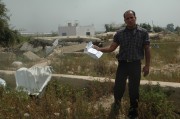West Bank: ‘no protection and no options’
 Saturday, April 10, 2010 at 10:14PM
Saturday, April 10, 2010 at 10:14PM April 9th, 2010
An Oxfam project is helping farmers in the West Bank’s ‘Area C’, where politics is preventing many from making a living off their own land. Willow Heske reports.
 Without building permits for permanent housing most families in area C are living in tents. Photo: Willow Heske
Without building permits for permanent housing most families in area C are living in tents. Photo: Willow Heske
The building of the new Palestinian Agricultural Ministry’s office in Jiftlik isn’t very new. In fact, it’s a one room, run-down old shack in the middle of a dusty field. The office’s generator is used to power the computer (there is no other form of electricity here) and a standing fan creates a distracting noise that makes one wonder how any work can get done at all.
Not for lack of will
Looking around at the barren landscape it quickly becomes apparent that work here, in fact, rarely does get done. Not for lack of will, but from lack of means.
“This area faces a lot of problems,” Awad Daraghmeh, an agronomist with the Agricultural Ministry explains. “The purpose of opening this office is to offer support for the farmers, but it is very difficult for the Palestinian Authority to have any real control.”
He continues to tell me that the Ministry is not allowed to invest in any building or rehabilitation projects in the area as a result of the Israeli Civil Administration’s tight control of this part of the occupied West Bank, known as ‘Area C.’
“Most of the farmers throughout this region are living in tents. They have no water, no electricity, no paved roads or grazing lands - we can’t even build new schools,” Daraghmeh adds.
The Palestinian breadbasket
Jerusalem has long been considered the heart of the Israeli-Palestinian conflict, but far away from the tensions of the crowded Old City streets, Area C is also vital to Palestinian statehood and self-sufficiency. It is commonly known as the ‘Palestinian breadbasket’, situated on 61 percent of the West Bank and 95 percent of the Palestinian Jordan Valley’s most fertile, arable land.
Despite being classified as Palestinian land under the Oslo Accords, which called for Israel to transfer complete control over the territory to the Palestinian Authority (PA) by 1999, Area C has never switched hands. As a result, planning, zoning, and building remain at the sole discretion of the Israeli Civil Administration, which has issued a freeze on building permits for the Palestinians who live here.
There has been much ado about the significance of this ‘new’ office, which has been seen by many as a move towards resisting Israeli annexation of this strategic territory. But the Palestinian Agricultural Ministry in Jiftlik also epitomizes all of the entrenched problems associated with living and working in Area C. Just to build a new office in this area of the West Bank, the PA would need permission from the Israeli Civil Administration, and such permission is almost never granted.
Restrictions
Farmers are particularly hard hit by restrictions on building access roads and storage centres, and have been barred by the Israeli Civil Administration from building new water wells. Of the estimated 150,000 Palestinians living here, 60,000 are not connected to a water network, and only 4,000 have access to sanitation services.
Many farmers complain that the lack of electricity also causes heavy losses because, without refrigerators, the vegetables rot quickly in the dry desert heat.
“We have no protection and we have no options. The Israeli Civil Administration has implemented policies that make Palestinian farming unprofitable,” said Harbi Abdullah, Chairman of the Al Aardh Agricultural Cooperative, who also told me he thought the Israeli Civil Administration wanted farmers like him to work as labourers on Israeli settlement farms instead of cultivating their own land.
Making a living off their own land
Recently Oxfam joined forces with local partners Economic and Social Development Center and the Palestinian Authority’s Agricultural Ministry in Jiftlik to deliver a project designed to help farmers in Area C continue to earn a living from farming their own land rather than relying on a wage earned working as labourers on settlement farms which are illegal under international law. With funding from the European Commission Directorate for Humanitarian Aid (ECHO) the project distributed rain-fed seeds such as wheat, sweet peas, and chick peas, and helped farmers with ploughing, fertilizing, and greenhouse repairs.
 Mahmoud Dias stands on the remains of his demolished home, holding the demolition notice. Photo: Willow Heske
Mahmoud Dias stands on the remains of his demolished home, holding the demolition notice. Photo: Willow Heske
Mahmoud Dias, a farmer who benefited from the Oxfam project, said that it improved his income this year. But despite this help, there is still that much remains to be done to improve his life.
“I live in a tent because I can’t get a building permit for a house. I built a simple house, just poured some concrete walls and a put on a tin roof. The Israeli military demolished it because I didn’t have a permit. Last year, the military confiscated my agricultural land twice. I can’t take my sheep out into the hills to graze because the green land is a closed military zone,” Mahmoud explained.
“I want to be strong. I want to stay here, but how can I continue when I keep losing everything over and over again?”
---------------------------------------
Catherine Weibel
Media & Communication Lead
Occupied Palestinian Territory / Israel
Oxfam International
POB 20560
Jerusalem
Mobile: + 972 54 639 5002
Phone/Fax: + 972 2 583 3838
 APJP |
APJP |  Post a Comment |
Post a Comment |
Reader Comments